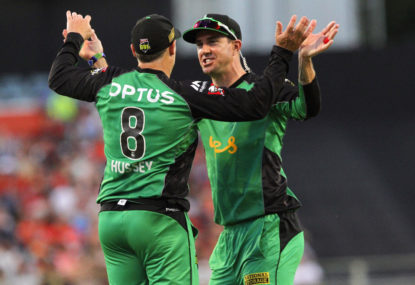Personally I think it would be a shame if Kevin Pietersen were suspended for his comments on the umpiring during the Big Bash semi-final, and not just because if he gets banned he’ll be unable to join Brett Geeves in the Players Who Have Been The Subjects Of Darren Lehmann’s Dickish Criticisms Invitational XI.
I think it would be a shame because, unlike most terrible things that have happened during KP’s career, this was not KP’s fault.
The blame lies rather with the worst innovation cricket has yet seen – and you know there’s some pretty stiff competition for that title.
I’m talking about the on-field player interview, the “miced-up” cricketer providing commentary on the game while he’s playing in it.
It’s a hideously ruinous aspect of the Twenty20 form of the game, and the only good thing to be said about it is that it hasn’t yet spread to the longer formats.
But for how long will that be the case? As the ratings for T20 rise ever higher, some bumbling lackwit in the corridors of power is sure to put two and two together to make zero, and decide that the reason the short form is so popular is the opportunity to hear insights from players in the middle, and that therefore the way to boost the popularity of tests and ODIs is to put wires on the participants of those as well.
And then we will truly be in hell.
Broadcasters’ love of the on-field interview stems, I think, from two sources. First is the conviction that commentators are completely incapable of filling air-time with their own observations and analysis, and that they need a direct injection of insight from the men or women in the middle to avoid hapless tedious floundering.
This conviction is, to be fair, not without a certain amount of evidence in its favour, but I say you’ll never get better commentators if you mollycoddle them.
The second source is the fact that broadcasters don’t really, you know…get sport. Which is weird because a lot of them used to play it, but it’s as if as soon as an ex-sportsperson enters a commentary box they sever some kind of sporting nerve ending and become beings of pure promotion.
They forget that a major part of the appeal of sport is that, although it is a form of entertainment, it stands apart from other entertainments by virtue of its competitive aspect, the genuine contest undertaken by real human beings striving for the upper hand over their opponents.
This is why sport is more popular the more there is at stake, why more people watch finals than non-finals in all sports, why the AFL’s attempts to make something exciting out of the pre-season are a depressing joke.
It’s why, no matter how much TV producers might think that audiences want to hear the inner thoughts of athletes mid-contest, we actually place a much higher premium on seeing sportspeople hurling themselves into the fray with irrepressible gusto.
This is the way in which the miced-up players degrade the viewing experience: while they banter with the commentary team, we know they’re not concentrating one hundred percent on the game, and the more enthusiastically they chirrup, the less focused they will be.
So an articulate, entertaining on-field chat equals a far less engaged player. A monosyllabic, surly respondent might be far more engaged with play, but then what’s the point of micing them up if they’re going to be so terse?
Most importantly, the fact of on-field interviews holds back the sport of T20 from true seriousness.
It’s a thrilling form of the game that has in its short life produced myriad classic moments, but it can never take its place among the great sports of the world while its organisers think the on-field action is of such little consequence that they are willing to risk players fouling up their team’s chances because they were too busy yarning with Flem and Howie to notice the ball flying at their face.
It’s a sign that the people in charge don’t respect their own product, and encourages us all to see the newest cricket variety as just another entertainment, when the whole point of sport is that it isn’t – otherwise we might as well just watch wrestling.
Finally, it’s not as if we’re ever going to find out anything all that interesting from these conversation anyway.
As the KP kerfuffle shows, the minute anyone says anything controversial there will be calls to ban them and attacks on their disrespectful attitude and players will quickly get the message to keep their thoughts to themselves.
The best we can hope for from a wired cricketer is the usual bland nothings about field placements and hitting zones: if the practice is to be worthwhile at all, surely what we want is indiscreet complaints, not just about umpires, but about the captain’s stupidity and the opposition batsman’s mental frailty and how the current bowler should’ve retired three years ago.
If we’re not going to get some real spice from the mic, I can’t see how this technological corruption is even remotely worth the demeaning effect it has on the game.
End it now, I say. Take away the microphones and let the players get on with playing, and let us get on with watching sport, not a slightly sweatier than average talk show.





























































































